
- •Lecture 3. International Arbitral Institutions
- •International Headquarters
- •The National committees of icc involve the leading companies and business associations more than 120 countries in the world. Can icc provide legal advice?
- •1. 3. Icc International Centre for adr
- •Key issues:
- •1. What is the difference between icc adr and icc Arbitration?
- •2. Where can the meetings in icc adr take place?
- •3. What is the duration of an icc adr proceeding?
- •London Court of International Arbitration (lcia). The London Court of International Arbitration History of the lcia
- •Organisation
- •Lcia Arbitration Rules (effective 1 January 1998)
- •3. Court of Arbitration for Sport (cas)- http://www.Tas-cas.Org
- •3.1 History of the Court of Arbitration for Sport.
- •3.2. Organisation of the cas from its creation until 1994
- •3. 3. The 1994 reform
- •The Paris Agreement
- •3. 4. Organisation and structure of the icas and cas
- •2. The International Council of Arbitration for Sport (icas)
- •3. The Court of Arbitration for Sport (cas)
- •What is the Court of Arbitration for Sport ?
- •What is the function of the cas ?
- •How are the arbitrators chosen ?
- •What law do the arbitrators apply ?
- •How much does the arbitration cost ?
- •How long does cas arbitration last ?
- •Are the arbitration proceedings confidential ?
- •What is the scope of an award pronounced by the cas ?
- •Is it possible to appeal against a cas award ?
- •What is cas mediation ?
- •Types of disputes submitted to the cas
- •The decentralised cas offices and the ad hoc divisions
- •4. Arbitration Institute of the Stockholm Chamber of Commerce (scc) Стокгольмский арбитраж
- •Преимущества Стокгольмского арбитража
- •Передача спора на рассмотрение в Стокгольмский арбитраж
- •Правила Стокгольмского арбитража
- •How does it work in practice?
How does it work in practice?
Stages
of the procedure:
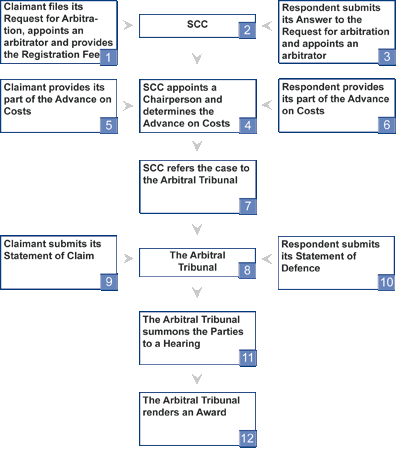
Claimant files its request for arbitration, appoints an arbitrator and provides the Registration Fee The request for arbitration shall include the names and addresses of the parties and their counsel, a summary of the dispute, a preliminary statement of relief sought, a copy of the arbitration agreement and, the name and address of the appointed arbitrator. The request may be faxed to the SCC or sent by e-mail. If the request is extensive, paper copies are preferred. In such case, the request should be submitted in five copies.
The SCC. The SCC makes a preliminary check on its jurisdiction and, if the registration fee is provided, notifies the respondent.
Respondent submits its answer to the request for arbitration and appoints an arbitrator. The answer shall include comments on the request and the name and address of the appointed arbitrator. The respondent should submit any counterclaim or set-off and any objections regarding jurisdiction in its answer. The answer may be brief.
The SCC appoints a chairperson and determines the advance on costs If the respondent fails to submit its answer, or if the answer does not contain any information regarding an appointed arbitrator, the SCC appoints an arbitrator on the respondent's behalf. Apart from appointing the chairperson and determining the advance on costs, the SCC decides the seat of arbitration, should the parties not have determined it already.
Claimant provides its part of the advance on costs The advance on costs shall be provided in cash to a specific bank account.
Respondent provides its part of the advance on costs The advance on costs shall be provided in cash to a specific bank account.
The SCC refers the case to the arbitral tribunal.
The arbitral tribunal. The arbitral tribunal, in compliance with the conditions set down in the arbitration agreement and the SCC Rules, determines the manner of conducting the proceedings.
Claimant submits its Statement of Claim. The claimant shall submit a statement of claim, including the following:
• The relief sought
• The material facts and circumstances
• A preliminary statement of evidence
The claimant may amend its claim until the closure of the proceedings if the amendments are comprised by the arbitration agreement and the arbitral tribunal does not oppose thereto on account of the point of time of the amendment.
Respondent submits its Statement of Defence
The arbitral tribunal summons the parties to a hearing. An oral hearing shall be arranged if requested by either party, or if the arbitral tribunal considers it appropriate. The tribunal shall determine the time for the hearing, its duration and how it is to be organised, including the manner in which evidence is to be presented. When planning the hearing, the arbitral tribunal shall take into account the wishes of the parties. At the hearing the parties shall, at the request of the arbitral tribunal, state the evidence on which they intend to rely.
The arbitral tribunal makes an award. An award shall be made not later than six months as from the date when the case was referred to the arbitral tribunal. The SCC in numbers - 2012
International disputes
surpassed the number of domestic disputes brought before the SCC in
2012. In addition, 10 investment treaty cases were brought before the
SCC, representing the highest number of investment treaty cases at
the SCC in one year.
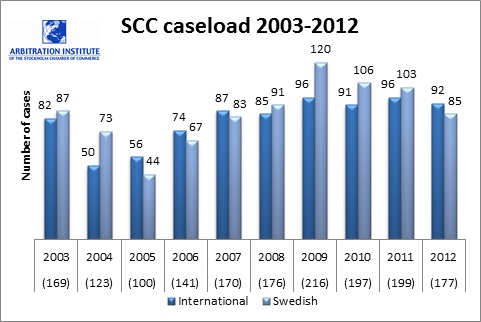 In
2012 parties brought 177 new cases. Of these 177 cases, 56% (99
cases) were cases administered under the SCC Rules. Parties also
commenced emergency arbitrator proceedings (2), expedited
arbitrations (63) and mediations (3) under the SCC Rules, and
requested SCC administrative services in appointing experts (2), and
SCC services in ad hoc (5) and UNCITRAL Arbitrations (3).
In
2012 parties brought 177 new cases. Of these 177 cases, 56% (99
cases) were cases administered under the SCC Rules. Parties also
commenced emergency arbitrator proceedings (2), expedited
arbitrations (63) and mediations (3) under the SCC Rules, and
requested SCC administrative services in appointing experts (2), and
SCC services in ad hoc (5) and UNCITRAL Arbitrations (3).
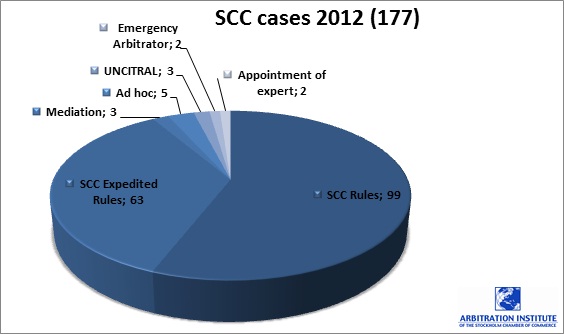 Most
frequently, parties brought disputes arising out of service and
supply agreements, representing 22,6% and 18,6% of the cases
registered during 2012, respectively. Parties also brought disputes
concerning business acquisitions (14,7%), real estate (8,5%),
investment treaty protection (5,6%), license agreements (4,5%), joint
ventures (4%), intellectual property (2,8%), among others.
Most
frequently, parties brought disputes arising out of service and
supply agreements, representing 22,6% and 18,6% of the cases
registered during 2012, respectively. Parties also brought disputes
concerning business acquisitions (14,7%), real estate (8,5%),
investment treaty protection (5,6%), license agreements (4,5%), joint
ventures (4%), intellectual property (2,8%), among others.
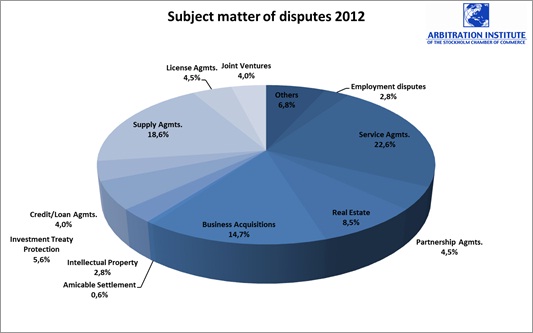 Investment
treaty arbitration cases
Investment
treaty arbitration cases
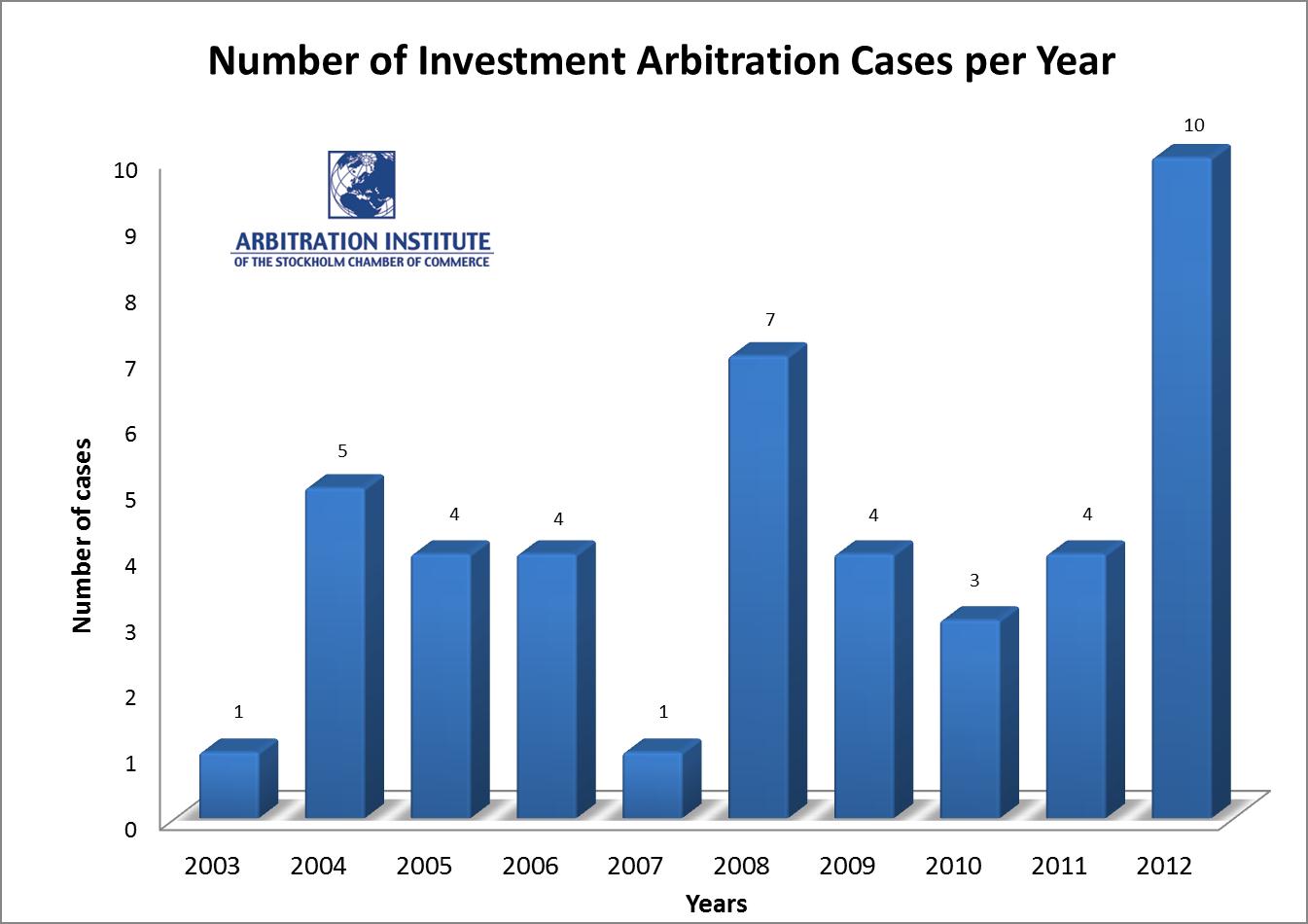 Click
on the picture to see larger version
Eight
out of the ten investment treaty arbitrations were brought under
alleged BITs violations and two of them were brought under alleged
violations of the Energy Charter Treaty (ECT). The ECT lists the SCC
as one of the three options for investor-state dispute resolution,
together with ICSID and UNCITRAL Arbitration Rules (ad hoc
proceedings).
50% of all new investment treaty
arbitrations in 2012 were administered under SCC Rules. 30% of the
investment disputes were conducted under ad hoc proceedings and 20%
under UNCITRAL Arbitration Rules.1
Click
on the picture to see larger version
Eight
out of the ten investment treaty arbitrations were brought under
alleged BITs violations and two of them were brought under alleged
violations of the Energy Charter Treaty (ECT). The ECT lists the SCC
as one of the three options for investor-state dispute resolution,
together with ICSID and UNCITRAL Arbitration Rules (ad hoc
proceedings).
50% of all new investment treaty
arbitrations in 2012 were administered under SCC Rules. 30% of the
investment disputes were conducted under ad hoc proceedings and 20%
under UNCITRAL Arbitration Rules.1
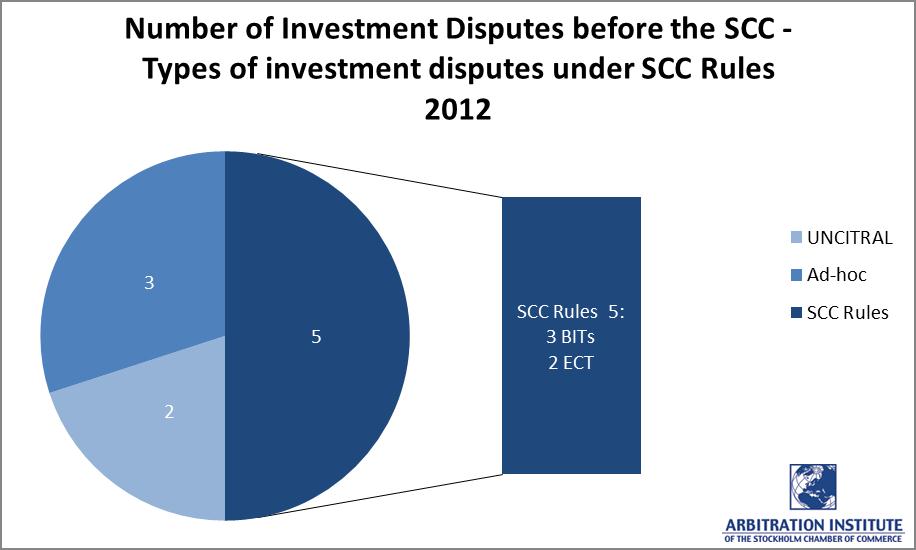 Click
on the picture to see larger version
In
2012, the nationality of the parties bringing their investment claims
varied compared to past years. Parties from Moldova (2), the
Netherlands (2) and Mauritius (2) appeared most frequently as
claimant. Other parties that brought their investment claims before
the SCC came from Ukraine, Germany, Egypt and Cyprus.
Click
on the picture to see larger version
In
2012, the nationality of the parties bringing their investment claims
varied compared to past years. Parties from Moldova (2), the
Netherlands (2) and Mauritius (2) appeared most frequently as
claimant. Other parties that brought their investment claims before
the SCC came from Ukraine, Germany, Egypt and Cyprus.
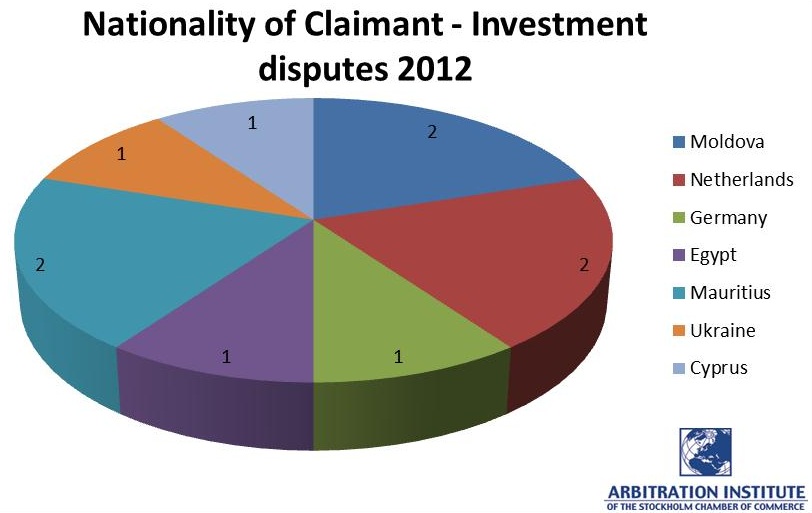 Click
on the picture to see larger version
Click
on the picture to see larger version
Answers:
How
do I start SCC arbitration?
The
claimant initiates arbitration by filing a request for arbitration
with the SCC Secretariat. Upon filing such request, the claimant
shall pay a registration fee.
For more detailed
information on go to “Initiation
of Arbitration”.
![]() to
the top
How
much is it?
The
arbitration costs consist of the fees of the arbitrators, the
administrative fee of the SCC and any expenses of the arbitral
tribunal or the SCC (such as hotel or travel expenses).
The
costs are based on the amount in dispute and are calculated in
accordance with a schedule of costs attached to the
SCC Rules.
The amount in dispute includes all claims, counterclaims and
set-offs. Where the amount in dispute cannot be ascertained, the SCC
Board determines the costs taking all relevant circumstances into
account.
Go to our calculator for an estimation of the
arbitration costs.
to
the top
How
long is an arbitration before SCC?
One
of the major reasons why the parties prefer arbitration before
litigation is speed. The SCC offers a fast and secure
process.
According to the SCC
Arbitration Rules
an arbitral award shall be rendered within six months and according
to the SCC
Rules for Expedited Arbitration
an award shall be rendered within three months. The time limits may
be extended by the SCC Board.
to
the top
Is
an arbitration clause necessary?
Yes.
The parties’ agreement to arbitrate, either as an arbitration
clause in a business contract or as a separate arbitration agreement,
is a requirement for resolving the dispute by arbitration instead of
state court proceedings.
to
the top
How
do I draft an arbitration clause?
On
our website you find several model
clauses
recommended to use when drafting a dispute resolution clause
referring to the SCC.
to
the top
Our
agreement refers to the Swedish Arbitration Act. What does that
mean?
If
the dispute resolution clause merely refers to the Swedish
Arbitration Act it means that any dispute in connection with the
contract shall be solved by arbitration according to the Act instead
of court proceedings. This type of arbitration is called ad hoc
arbitration.
If the clause does not contain a reference to
the SCC, the SCC lacks jurisdiction and the parties and arbitrators
must administer the arbitration pursuant to the Act
themselves.
However, should the parties so wish they could
reach a new arbitration agreement referring the dispute to the
SCC.
to
the top
What
is the difference between the SCC Arbitration Rules and the SCC Rules
for Expedited Arbitration?
If
the parties have not agreed otherwise, the arbitral tribunal shall
consist of three arbitrators according to the
SCC Arbitration Rules.
However, if the arbitration clause in silent on the number of
arbitrators, the SCC Board may (taking into account the complexity of
the case, the amount in dispute or other circumstances) decide that
the tribunal shall consist of a sole arbitrator. When the SCC
Rules for Expedited Arbitrations
are applied, a sole arbitrator shall always decide the
dispute.
Moreover, pursuant to the SCC Arbitration Rules,
the final award shall be made not later than six months from when the
arbitration was referred to the arbitral tribunal. In accordance with
the SCC Expedited Rules such time limit is three months.
In
SCC Expedited Arbitration, the number of written statements is
limited and a hearing shall be held only if deemed necessary by the
sole arbitrator.
The SCC Expedited Rules provide a faster
and less costly alternative and are developed for minor and not too
complex disputes.
to
the top
What
is the difference between arbitration and litigation?
Arbitration
has several advantages in comparison to court proceedings.
Arbitration is faster, confidential and more flexible. The parties
have great influence on the proceedings - i.e. language, applicable
law and seat of arbitration. Furthermore, since each party shall
appoint an equal number of arbitrators, the parties can ensure the
arbitral tribunal possess the relevant qualifications.
If
the dispute concerns an international relationship, arbitration is
preferable since the award is recognized and enforceable almost all
over the world thanks to the
New York Convention of 1958.
In
contrary to a state court judgment, an arbitral award cannot be
appealed on the merits.
In arbitration the parties pay,
besides costs for legal representation, fees to the arbitral tribunal
and the SCC and any expenses occurred during the arbitration.
to
the top
How
do I appoint an arbitrator?
Unlike
some other arbitration institutions, the SCC does not keep a
list/panel of arbitrators. Consequently, a party is free to appoint
anyone as arbitrator as long as he or she is impartial and
independent.
At the request of a party, the SCC can assist
by recommending a few people suitable as arbitrators.
When
appointing a chairperson or a sole arbitrator, the SCC Board for
example takes the following aspects into consideration:
to
the top
How
much is it?
The
arbitration costs consist of the fees of the arbitrators, the
administrative fee of the SCC and any expenses of the arbitral
tribunal or the SCC (such as hotel or travel expenses).
The
costs are based on the amount in dispute and are calculated in
accordance with a schedule of costs attached to the
SCC Rules.
The amount in dispute includes all claims, counterclaims and
set-offs. Where the amount in dispute cannot be ascertained, the SCC
Board determines the costs taking all relevant circumstances into
account.
Go to our calculator for an estimation of the
arbitration costs.
to
the top
How
long is an arbitration before SCC?
One
of the major reasons why the parties prefer arbitration before
litigation is speed. The SCC offers a fast and secure
process.
According to the SCC
Arbitration Rules
an arbitral award shall be rendered within six months and according
to the SCC
Rules for Expedited Arbitration
an award shall be rendered within three months. The time limits may
be extended by the SCC Board.
to
the top
Is
an arbitration clause necessary?
Yes.
The parties’ agreement to arbitrate, either as an arbitration
clause in a business contract or as a separate arbitration agreement,
is a requirement for resolving the dispute by arbitration instead of
state court proceedings.
to
the top
How
do I draft an arbitration clause?
On
our website you find several model
clauses
recommended to use when drafting a dispute resolution clause
referring to the SCC.
to
the top
Our
agreement refers to the Swedish Arbitration Act. What does that
mean?
If
the dispute resolution clause merely refers to the Swedish
Arbitration Act it means that any dispute in connection with the
contract shall be solved by arbitration according to the Act instead
of court proceedings. This type of arbitration is called ad hoc
arbitration.
If the clause does not contain a reference to
the SCC, the SCC lacks jurisdiction and the parties and arbitrators
must administer the arbitration pursuant to the Act
themselves.
However, should the parties so wish they could
reach a new arbitration agreement referring the dispute to the
SCC.
to
the top
What
is the difference between the SCC Arbitration Rules and the SCC Rules
for Expedited Arbitration?
If
the parties have not agreed otherwise, the arbitral tribunal shall
consist of three arbitrators according to the
SCC Arbitration Rules.
However, if the arbitration clause in silent on the number of
arbitrators, the SCC Board may (taking into account the complexity of
the case, the amount in dispute or other circumstances) decide that
the tribunal shall consist of a sole arbitrator. When the SCC
Rules for Expedited Arbitrations
are applied, a sole arbitrator shall always decide the
dispute.
Moreover, pursuant to the SCC Arbitration Rules,
the final award shall be made not later than six months from when the
arbitration was referred to the arbitral tribunal. In accordance with
the SCC Expedited Rules such time limit is three months.
In
SCC Expedited Arbitration, the number of written statements is
limited and a hearing shall be held only if deemed necessary by the
sole arbitrator.
The SCC Expedited Rules provide a faster
and less costly alternative and are developed for minor and not too
complex disputes.
to
the top
What
is the difference between arbitration and litigation?
Arbitration
has several advantages in comparison to court proceedings.
Arbitration is faster, confidential and more flexible. The parties
have great influence on the proceedings - i.e. language, applicable
law and seat of arbitration. Furthermore, since each party shall
appoint an equal number of arbitrators, the parties can ensure the
arbitral tribunal possess the relevant qualifications.
If
the dispute concerns an international relationship, arbitration is
preferable since the award is recognized and enforceable almost all
over the world thanks to the
New York Convention of 1958.
In
contrary to a state court judgment, an arbitral award cannot be
appealed on the merits.
In arbitration the parties pay,
besides costs for legal representation, fees to the arbitral tribunal
and the SCC and any expenses occurred during the arbitration.
to
the top
How
do I appoint an arbitrator?
Unlike
some other arbitration institutions, the SCC does not keep a
list/panel of arbitrators. Consequently, a party is free to appoint
anyone as arbitrator as long as he or she is impartial and
independent.
At the request of a party, the SCC can assist
by recommending a few people suitable as arbitrators.
When
appointing a chairperson or a sole arbitrator, the SCC Board for
example takes the following aspects into consideration:
Experience as arbitrator,
the subject matter of the dispute,
applicable law,
the seat of arbitration and
language of the proceedings.
If the parties are of different nationalities the SCC appoints a chairperson or a sole arbitrator from a third country. to the top What should be included in the respondent’s answer? The answer may be brief. It shall include the respondent’s position regarding the claimant’s relief, a preliminary statement of any counterclaim or set-offs, the arbitrator appointed (unless the arbitration is to be decided by a sole arbitrator) and any jurisdictional objections. If the claimant has argued on applicable set of arbitration rules, language to be used, number of arbitrators, seat of arbitration or anything else that might affect the process, the respondent is advised to comment thereon in its answer. to the top What is mediation? Besides arbitration the SCC offers Mediation Rules. Mediation is an alternative to arbitration and litigation. It is a fast and inexpensive way of resolving commercial disputes where the parties fully control the entire process. After a successful mediation the parties often may continue doing business. The purpose is to reach an amicable settlement between the parties. An independent third party, acting as mediator, assists in order to help the parties to conduct practical discussions and finding a solution acceptable for both parties. A mediator may be appointed by the SCC or by the parties jointly. The parties may, at any time, terminate the attempt to mediate. For more information go to the SCC Mediation Institute. to the top Do we have to sit in Stockholm when conducting SCC arbitration? No. The seat of arbitration is agreed upon by the parties or, failing such an agreement, by the SCC Board. Furthermore, the arbitral tribunal may, after consultation with the parties, conduct hearings etc at another place than the seat of arbitration. to the top What is new in the 2007 SCC Arbitration Rules? The new SCC Rules is applied to all cases filed after 1 January 2007. No fundamental changes were made in the 2007 SCC Rules. The revision primarily aimed at making the SCC Rules correspond to recent practice and developments in international arbitration. The structure of the SCC Rules and the transparency of the decision-making procedures were also improved. One of the most important changes was the provision regarding consolidation, which enables the SCC Board, upon the request of a party, to consolidate arbitral proceedings, if the cases concern the same legal relationship and involve the same parties. Such decision can be made only after consultation with the arbitral tribunal and the parties. Furthermore, the possibility for the parties to influence the appointment proceedings was improved by a new provision on the appointment of a sole arbitrator. According to this provision the parties are given 30 days to jointly appoint such arbitrator. A new feature was added to the provision regarding interim measures. Now the arbitral tribunal may grant an interim measure in the form of an order or in the form of an award. Further, the tribunal has the power to make a separate award ordering one party to reimbu
